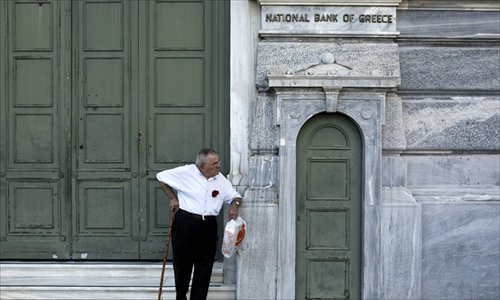HOME >> WORLD
Greece shuts banks as default looms, closer to euro exit
Source:Agencies-Global Times Published: 2015-6-30 0:13:01
Athens unlikely to embrace Beijing, Moscow: analyst

A pensioner waits outside a branch of the National Bank of Greece to get his pension on Monday in Athens. Greece announced it will shut banks for a week and impose capital controls, pleading for calm after anxious citizens emptied cash machines in a dramatic escalation of the country's debt crisis. Photo: AFP
Greeks woke up to shuttered banks, closed cash machines and a climate of rumors and conspiracy theories on Monday as a breakdown in talks between Athens and its creditors plunged the country deep into crisis.Prime Minister Alexis Tsipras, who blindsided creditors by calling a referendum on the austerity cuts in the aid package proposed by the creditors, appeared on television on Sunday night to announce capital controls to prevent banks from collapsing.
Their imposition capped a dramatic weekend for Greece that has pushed the country toward a likely default on 1.6 billion euros ($1.77 billion) of International Monetary Fund loans on Tuesday and closer to an exit from the euro currency bloc.
French President Francois Hollande appealed to Tsipras to return to the negotiating table and German Chancellor Angela Merkel said she was willing to talk to the 40-year-old Greek leader if he wanted.
Merkel also criticized the government of Tsipras for failing to compromise with its eurozone partners after receiving what she called a "generous" offer.
EU Commission head Jean-Claude Juncker said on Monday he felt "betrayed" by the failure of Athens to agree on a bailout deal with EU ministers, despite the huge efforts made.
He urged Greeks to back the cash-for-reform package, saying a "no" vote in the referendum would mean Greece was turning its back on the EU.
Nervous EU
The EU is also nervous about Greece getting closer to Russia or China to seek a better deal, but analysts said the assumption is not necessarily true.
"If Greece withdraws, it will not embrace Russia or China to seek economic support in particular, as the two countries are not Greece's inevitable choices," said Feng Zhongping, vice president of the China Institutes of Contemporary International Relations.
Instead, Athens is likely to take a "multi-faceted diplomatic strategy," said Shen Jiru, a research fellow at the Chinese Academy of Social Sciences.
Standing by Russia is contrary to the fiscally-fragile country's interests, as Greece, which still heavily depends on the EU, will be isolated if it turns to Russia, Shen said.
Experts, however, expected limited impact from Greece's potential withdrawal on China's economy.
China can still resort to yuan settlement when investing in Greece to mitigate financial risks, if the country readopts its currency, drachma, whose exchange rate will certainly fluctuate sharply, Shen said.
European bank shares fell sharply on Monday. Top banks in Spain, France and Germany were down more than 6 percent as the risk of a spillover to banks in other eurozone countries spooked investors.
The Greek government will keep banks shut at least until after July 5, the date of the referendum, and withdrawals from automated teller machines will be limited to 60 euros a day when they reopen on Tuesday. The stock exchange will also stay shut.
However, a Greek official said banks were expected to open 850 branches for the payment of pensions on Thursday, a step for which continued support from the European Central Bank would be necessary.
Placing blame
After months of wrangling, Greece's exasperated European partners have put the blame for the crisis squarely on Tsipras's shoulders.
The creditors wanted Greece to cut pensions and raise taxes in ways that Tsipras has long-argued would deepen one of the worst economic crises of modern times in a country where a quarter of the workforce is already unemployed.
As Tsipras announced the emergency measures late on Sunday, there were long queues outside ATMs and petrol stations as people raced to take out cash before it was too late.
Despite the hardening of positions, officials around Europe and the US made a frantic round of calls and organized meetings to try to salvage the situation.
US President Barack Obama called Merkel, and senior US officials including Treasury Secretary Jacob Lew, who spoke to Tsipras, urged Europe to come up with a plan to hold the single currency together and keep Greece in the eurozone.
Posted in: Europe